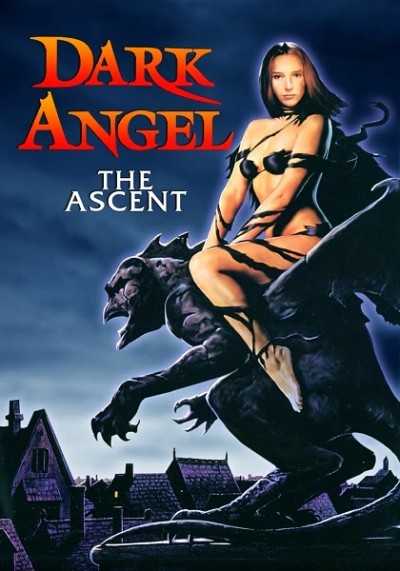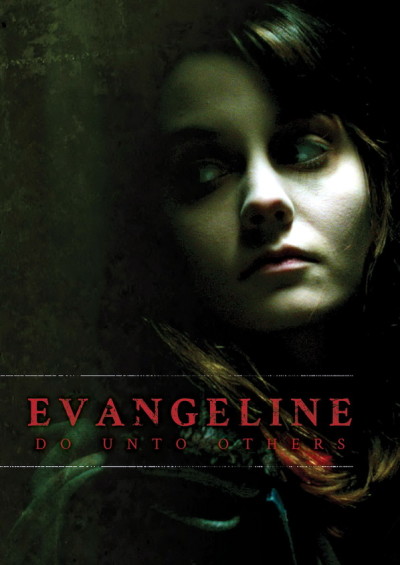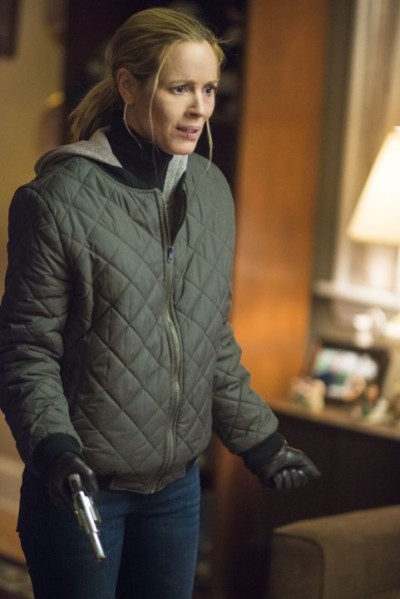★★★
“Not-so real housewives.”
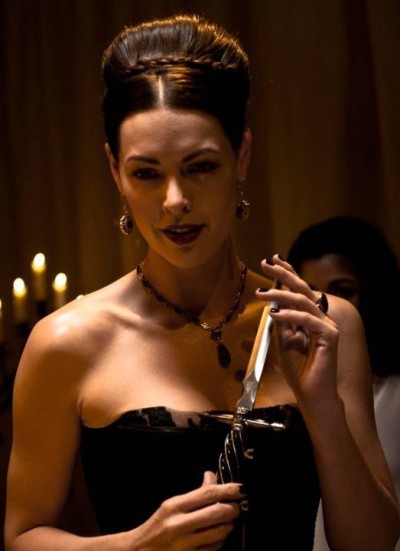 A somewhat successful modernization of the vampire legend, it sees feminist wannabe journo Leah (Scagliotti) clashing with the popular clique at her high-school, under their queen bee Ashley (Okuda). Just as Leah is preparing a devastating expose on how the cool girls are planning a mass virginity loss, the ground gets pulled out from under her by the arrival of Liz Batho (Louise Griffiths), a counselor who begins a devastatingly successful abstinence program, the Virginity Action Group, into which Ashley and her cronies buy in, for their own ends. Liz also lures in the local moms, with her devastatingly impressive line of skin-care products. Leah digs into the past of Ms. Batho and thanks to a helpful tip from her Internet search engine (which is, at least, a first in cinematic plotting!), realizes Liz is – gasp! – Countess Elizabeth Bathory, who escaped being walled up in her chamber, and has roamed the world ever since, using the blood of virgins to sustain her youth. But since Leah’s relationship with local police soured following an article calling them racist, she’s going to have to stop the Countess using her own resources.
A somewhat successful modernization of the vampire legend, it sees feminist wannabe journo Leah (Scagliotti) clashing with the popular clique at her high-school, under their queen bee Ashley (Okuda). Just as Leah is preparing a devastating expose on how the cool girls are planning a mass virginity loss, the ground gets pulled out from under her by the arrival of Liz Batho (Louise Griffiths), a counselor who begins a devastatingly successful abstinence program, the Virginity Action Group, into which Ashley and her cronies buy in, for their own ends. Liz also lures in the local moms, with her devastatingly impressive line of skin-care products. Leah digs into the past of Ms. Batho and thanks to a helpful tip from her Internet search engine (which is, at least, a first in cinematic plotting!), realizes Liz is – gasp! – Countess Elizabeth Bathory, who escaped being walled up in her chamber, and has roamed the world ever since, using the blood of virgins to sustain her youth. But since Leah’s relationship with local police soured following an article calling them racist, she’s going to have to stop the Countess using her own resources.
The results are sporadically funny. It’s a nice reversal on the usual horror trope of “have sex and die,” [albeit not the first: Cherry Falls already got there], and some of the characters are a hoot. Griffiths hits the spot just right as Bathory, combining elegance and threat with just a hint of Katie Holmes, and Okuda makes the Alpha Bitch far more rounded than most depictions [it took Chris to realize where we’d seen her before; she plays Tinkerballa in popular web-series The Guild] But she and Scagliotti are both clearly past high-school, well into their twenties, and so aren’t convincing teenagers. The heroine also appears to have eaten a dictionary, leading to dialogue that is both forced and not as witty as it thinks it is. Worst of all, I could have done entirely without Leah’s lesbian sidekick (Raisa), since her main purpose in the film appears to be to allow for embarrassingly-bad banter with her gal-pal.
It does make some nice stabs (hohoho) at social satire, in particularly the hypocrisy of high-school and American vs. European values, but it’s a bit too monotone in its approach. I did appreciate its almost entirely gynocentric nature. The only male character of note, is in the film mostly to ensure Leah is no use to the Countess, and when the chips are down, rather than rescuing anyone, is disposed of with ease, leaving Leah to face her immortal enemy alone. However, there remains too much of a problem with the heroine, who comes over for much of the movie as smugly PC, rather than someone with whom I’m interested in spending time. It’s this which restricts the film’s eventual success, leaving it as more of a respectable time-passer than an outstanding triumph.
Dir: John V. Knowles
Star: Allison Scagliotti, Louise Griffiths, Amy Okuda, Francia Raisa





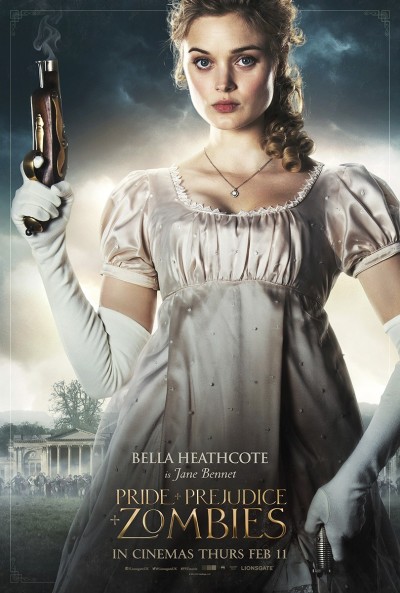











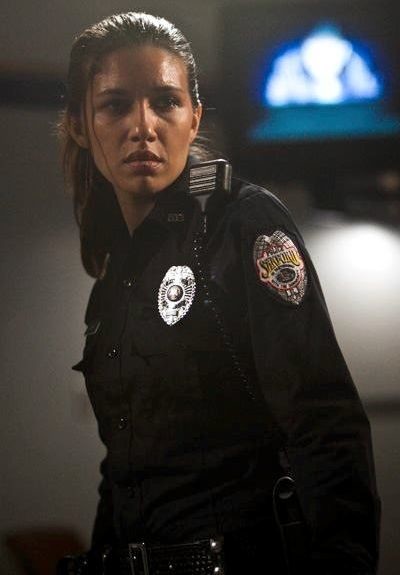

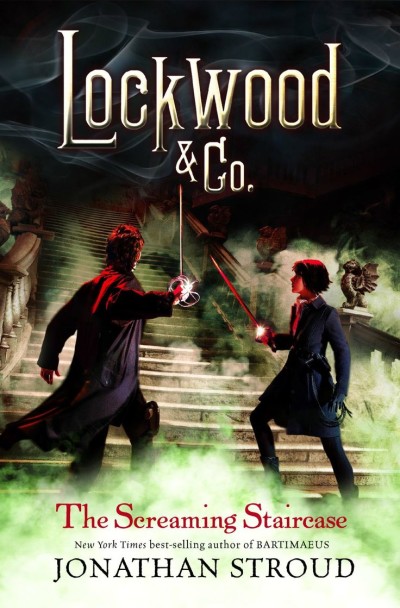
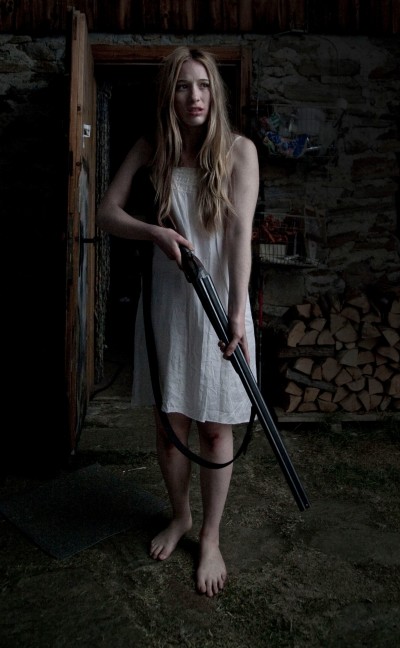
 Just in time for Halloween comes this atmospherically and spooky tale, in which teenager Dora (Rose) has a day – and a night – to remember. It begins with her discovering that she’s pregnant, news which initially causes her to stay home and brood over her future. She changes her mind and texts her boyfriend to come pick her up; he never shows, and instead she finds herself increasingly tormented by young, masked figures, who repeatedly knock on her door. The doctor (Sutherland) makes a house call, only to discover Dora has gone from four weeks to four months pregnant in just a few hours. Dora is also being plagued by nightmarish visions sacrifice, and it becomes clear that those little figures have some very unpleasant plans for our heroine and her baby-to-be.
Just in time for Halloween comes this atmospherically and spooky tale, in which teenager Dora (Rose) has a day – and a night – to remember. It begins with her discovering that she’s pregnant, news which initially causes her to stay home and brood over her future. She changes her mind and texts her boyfriend to come pick her up; he never shows, and instead she finds herself increasingly tormented by young, masked figures, who repeatedly knock on her door. The doctor (Sutherland) makes a house call, only to discover Dora has gone from four weeks to four months pregnant in just a few hours. Dora is also being plagued by nightmarish visions sacrifice, and it becomes clear that those little figures have some very unpleasant plans for our heroine and her baby-to-be.